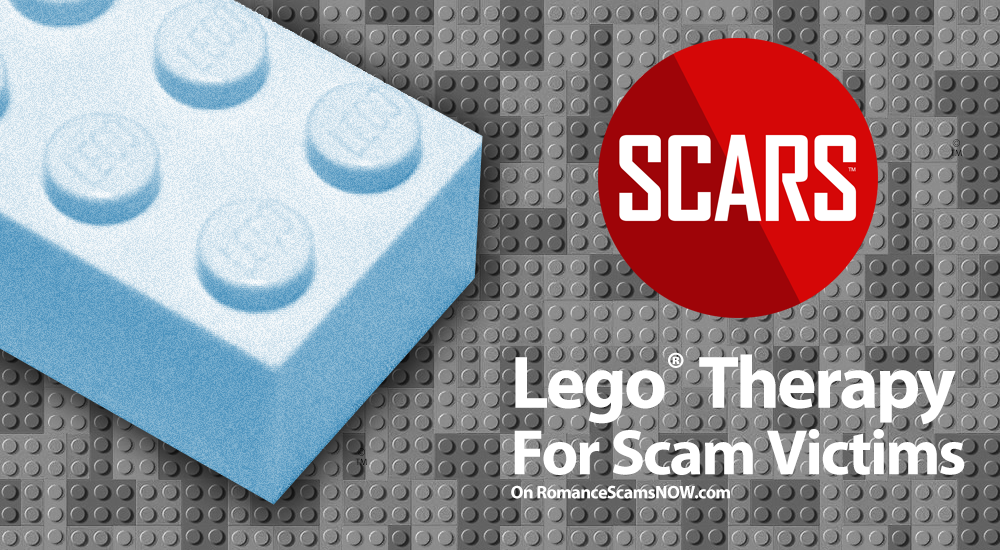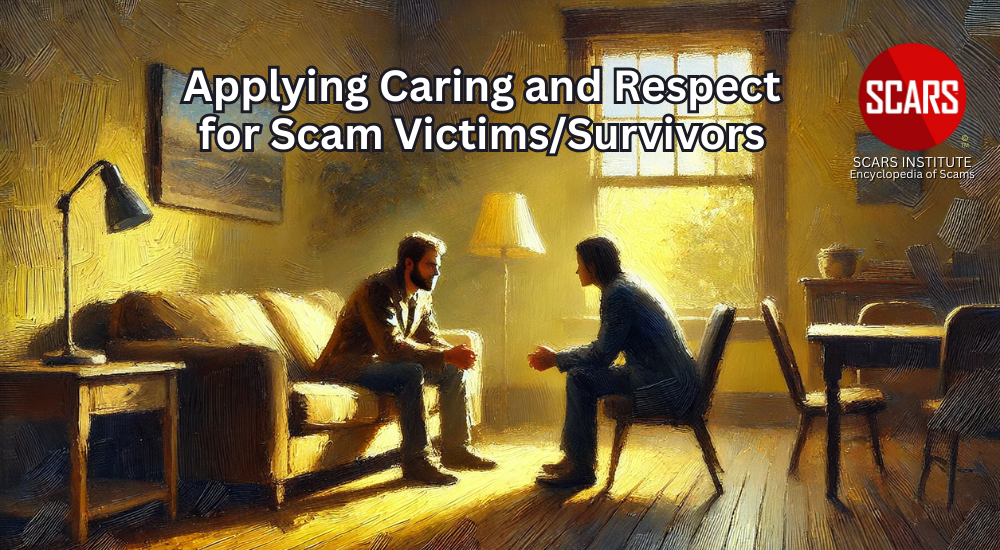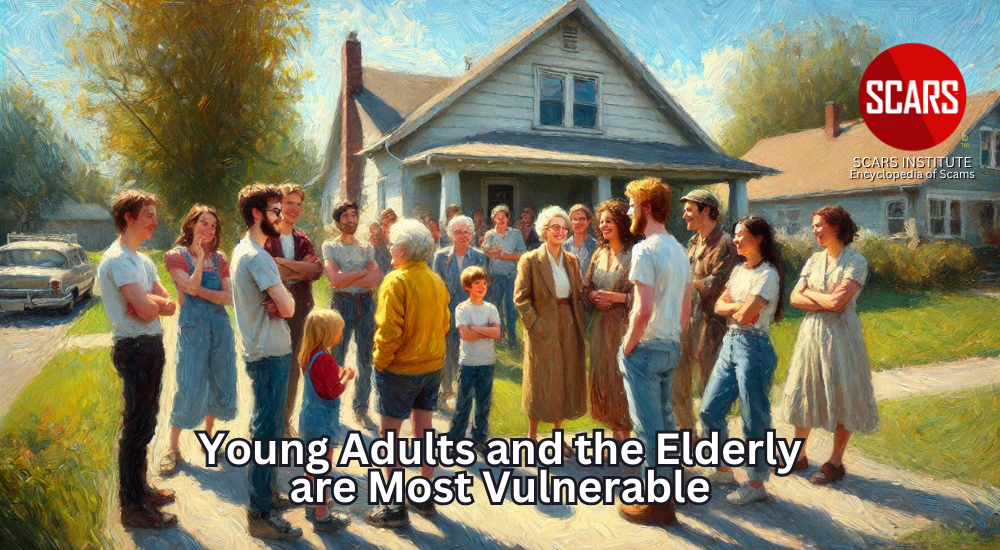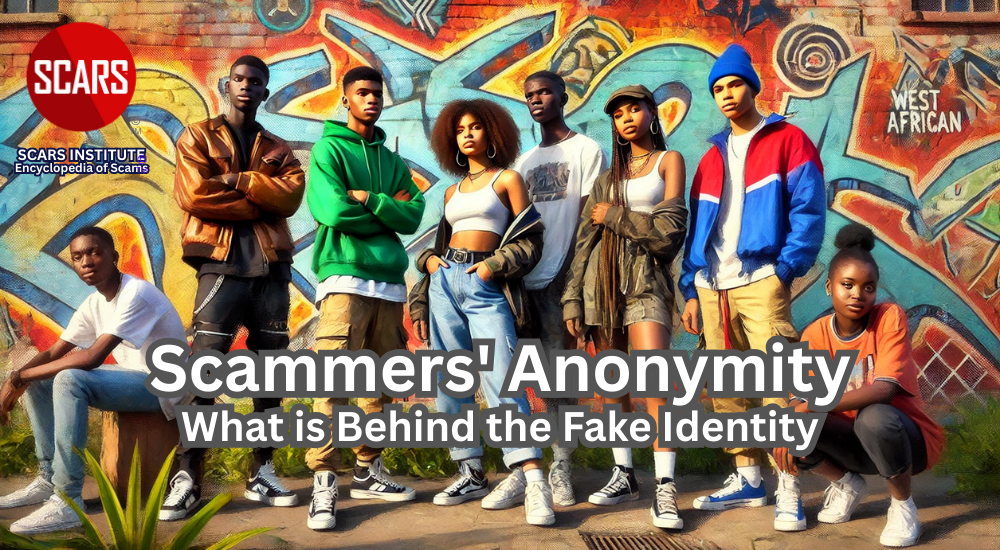Lego Therapy For Scam Victims
Helping Traumatized Scam Victims To Recover
Recovery Psychology – A SCARS Insight
Author:
• Tim McGuinness, Ph.D., DFin, MCPO, MAnth – Anthropologist, Scientist, Director of the Society of Citizens Against Relationship Scams Inc.
Article Abstract
Lego Therapy is an innovative therapeutic approach that uses building with Lego bricks as a tool for emotional healing, particularly for trauma victims, including scam survivors. By engaging in creative activities, individuals can express their feelings, process complex emotions, and gain a sense of accomplishment.
This form of therapy helps reduce anxiety, stress, and grief by providing a controlled environment where individuals focus on problem-solving, mindfulness, and emotional expression. Lego Therapy also fosters connection, allowing participants to rebuild their self-esteem, reduce isolation, and promote recovery.
![Scam Victim Recovery banner 2024 Lego Therapy For Scam Victims - 2023 [UPDATED 2024] 1](https://romancescamsnow.com/wp-content/uploads/2024/08/Scam-Victim-Recovery-banner-2024.png)
Using Lego Therapy to Help Scam Victims to Recover
What Is Lego Therapy?
Lego bricks can be used as a therapeutic tool to help people, including crime victims, to cope with trauma and emotions
Lego Therapy, in other words, building with Lego bricks can help people express their feelings and ideas in a safe and controlled way, as well as provide a sense of accomplishment and control. Working with a therapist or counselor, people can use the act of building and create with Lego bricks as a way to process their emotions and work through difficult experiences.
Creativity can be an important part of the healing process for people who have experienced trauma. Engaging in creative activities can provide a sense of accomplishment and can help people express their emotions and thoughts in a healthy way. Creativity can also be a way for people to take their minds off of their difficult experiences and find moments of joy and pleasure. In effect, Lego therapy provides a means of achieving Mindfulness. Additionally, creativity can be a way for people to feel a sense of control over their lives and can help to reduce feelings of helplessness.
Here are Ten Reasons Why Creativity can be Important when Trying to Recover from Trauma
- Creativity can provide a sense of accomplishment and purpose.
- It can be a way to express emotions and thoughts in a healthy way.
- Creativity can be a form of self-care and can help reduce stress.
- Engaging in creative activities can be a way to take the mind off of difficult experiences.
- Creativity can provide moments of joy and pleasure.
- It can be a way to feel a sense of control over one’s life.
- Creativity can promote self-esteem and self-worth.
- It can be a way to cope with and process trauma.
- Creativity can be a form of self-expression and can promote self-discovery.
- When done with others it can be a way to connect with others and form supportive relationships.
There Is A Difference Between Unstructured Creativity And Structured
Unstructured creativity refers to a type of creative activity that is open-ended and does not have a specific goal or outcome in mind. This can be in contrast to structured creativity, which is a more intentional and planned approach to creating something. Unstructured creativity might involve activities like doodling, coloring, or playing with Play-Doh, where the focus is on the process of creating rather than the end result. This type of creativity can be relaxing and therapeutic and can be a way for people to express themselves and explore their imagination without the pressure of creating something specific.
Puzzles are not creative. Paint by the numbers is also not creative. These have structured outcomes and use the logical part of your brain.
Lego therapy has the advantage that it is unstructured, meaning you can create anything you want. This both reduces pressure and anxiety in the creative process and allows the creative part of your mind a voice. Your creativity tends to go into hiding after trauma, and this allows it to come back, which is excellent for grief processing.
You Can Also Use Lego Therapy As A Discovery Tool
Your mind can help you realize things that may be hidden from you in any other way.
For example: you can give yourself a task to create a scene of something that triggers you. You can also look (after you have built something) at what you did and how you did it – such as brick color choices (black = denial, red = anger, blue/green can equal acceptance).
If you are going to try this, we suggest buying this kit: https://www.lego.com/en-us/product/creative-suitcase-10713 – it is not something that is a specific design, you can build anything you want, and it is only $20. Building goofy-looking animals is fun.
Using Lego As A Therapeutic Tool In Counseling Or Therapy
What are the benefits of LEGO Therapy?
There are two ways that Lego therapy can be employed in a therapeutic context:
An individual working with a counselor or therapist
In a group context where multiple people build together or where they take turns adding on to a joint structure
Using Lego Bricks To Help Reduce Anxiety & Stress
Lego therapy has been effective at reducing anxiety in individuals as well. Building with Lego is an excellent way to practice mindfulness, which can be effective in reducing stress according to many.
Building with Lego bricks can be a therapeutic and stress-relieving activity for a number of reasons:
- First, the act of building requires concentration and focus, which can help to distract the mind from negative or anxious thoughts. It can also be a meditative activity that allows individuals to enter a state of flow, where they are fully immersed in the task at hand. This can help to reduce stress and anxiety by providing a sense of calm and clarity.
- Second, the process of building with Lego bricks requires problem-solving and decision-making skills, which can help to boost confidence and self-esteem. The sense of accomplishment that comes with successfully completing a Lego project can also provide a sense of pride and satisfaction, which can be especially helpful for individuals who may be feeling anxious or stressed, or traumatized.
- Finally, building with Lego bricks can be a social activity that allows individuals to connect with others and share in the creative process. Engaging in activities with others can help to reduce feelings of loneliness and isolation, which are common contributors to stress and anxiety.
Lego therapy can be a fun and enjoyable way to reduce stress and anxiety. It provides an opportunity to engage the mind, boost confidence, and connect with others, all of which can help to promote a sense of well-being and relaxation.
In a Recent Article:
Playing with Lego can stop you from being a mental time traveller – By Sandy Summons
There’s an old saying that “many hands make light work”. However, it seems that working with your hands can also relieve stress and reduce feelings of anxiety. This is especially true when your activities involve a repetitive action, contributing to a sense of mindfulness. And these activities are proven to boost wellbeing and health, and lower stress.
“Since our time in isolation, many people have found their way back to basics and making use of their hands …whether this be planting a vegetable garden, baking from scratch, being creative with art and craft activities like, knitting, jewellery making or clay,” Brisbane clinical psychotherapist Natajsa Wagner says.
“Doing mindful activities with our hands requires a rhythm and repetition that requires both our physical and cognitive skills, especially if we are creating something.”
Wagner says repetitive activities, like drumming, colouring, and sewing, provide important sensory input. “They can calm our lower brain system and help regulate our emotions and decrease stress,” she says.
Using Lego To Help With Processing Grief
Building with Lego bricks can be a helpful activity for individuals who are struggling with grief.
Grief is a complex experience and often comes with difficult emotions that need to be navigated, and finding healthy ways to cope with it can be challenging. Building with Lego bricks can provide relief and a number of benefits to those who are grieving.
- First, the act of building requires concentration and focus, which can help to distract the mind from negative or painful thoughts. It can also be a meditative activity that allows individuals to enter a state of flow, where they are fully immersed in the task at hand. This can provide a sense of calm and clarity, which can be especially helpful for those who are struggling with the overwhelming emotions that often accompany grief.
- Second, building with Lego bricks can be a creative outlet that allows individuals to express themselves in unique and meaningful ways. Creating something with their hands can provide a sense of accomplishment and purpose, which can be especially important for those who are struggling to find meaning in their lives after experiencing a significant loss.
- Finally, building with Lego bricks can be a social activity that allows individuals to connect with others and share in the creative process. Engaging in activities with others (either with other adults or children) can help to reduce feelings of loneliness and isolation, which are common during the grieving process.
Building with Lego bricks can be a helpful and therapeutic activity for those who are struggling with the process of grief. It provides an opportunity to engage the mind, express oneself creatively, and connect with others, all of which can help to promote healing and resilience.
Individual Use Of Lego Therapy As A Self-Help Therapeutic
Individual Lego Therapy
We often hear from individuals, especially crime victims who have been profoundly traumatized about how difficult it is to reveal themselves in therapy. Just sitting there with the total attention of the counselor or therapist on them can be very anxiety-inducing. But, if the individual could sit apart on their own and engage in a creative task without the therapist hovering over them, they are able to release the tension and turn the session into a more relaxed and enjoyable moment.
After the person builds something with Lego bricks, the therapist can then begin a dialog about what it is and why the person made the choices they made during its construction. This can be very revealing about the current state of mind, level of trauma, and even potential triggers.
Our Purpose
Our purpose in writing about Lego therapy is not to provide a manual for the therapist, nor psychological diagnosis of individuals, after all, SCARS is not a mental healthcare provider, but rather to introduce the concept to the scam victims either receiving therapy or who are on their own trying to recovery the self-help route. That even adults (especially adults) can benefit from the seemingly mindless (mindful) creative activity that is the Lego system.
Why This Works?
Building with Lego bricks can be a helpful activity for individuals who have experienced trauma, such as victims of crime.
Trauma can have a profound and lasting impact on an individual’s mental health, and finding healthy ways to cope with it can be essential for recovery. Building with Lego bricks can provide a number of benefits for traumatized individuals.
- First, the act of building requires concentration and focus, which can help to distract the mind from negative or traumatic memories. It can also be a meditative activity (mindfulness) that allows individuals to enter a state of calm, where they are fully immersed in the task at hand. This can provide a sense of calm and clarity, which can be especially helpful for those who are struggling with the overwhelming emotions that often accompany trauma.
- Second, building with Lego bricks can be a creative outlet that allows individuals to express themselves in a unique and meaningful way. Creating something with their hands can provide a sense of accomplishment and purpose, which can be especially important for those who are struggling to find meaning in their lives after experiencing a traumatic event such as a relationship scam or other significant financial fraud.
- Third, building with Lego bricks can be a therapeutic activity that allows individuals to process their emotions and experiences in a safe and controlled way. The act of creating something tangible and concrete can provide a sense of control and agency, which can be especially important for those who have felt powerless or victimized.
- Fourth, crime victims can create things that are about the crime and this can help to desensitize them.
- Fifth, things that they build can bring a sense of pride or achievement that can be posted on their social media as a safe way to interact with others. This can be a bridge back to family and friends when victims feel guilt or shame and are afraid to talk with others, because they may see their shame or because they may judge them. Lego structures can be a fun way to engage without those risks.
- Finally, building with Lego bricks can be a social activity that allows individuals to connect with others and share in the creative process. When they visit family or friends, they can bring a Lego set with them and sit at the kitchen table having coffee, talking, and enjoying time together while building something with Lego. Engaging in activities with others can help to reduce feelings of loneliness and isolation, which are common for traumatized individuals.
Overall, building with Lego bricks can be a helpful and therapeutic activity for traumatized individuals, such as victims of crime. It provides an opportunity to engage the mind, express oneself creatively, and connect with others, all of which can help to promote healing and resilience.
Group Therapy Use Of Lego As A Therapeutic Tool
Group/Social Lego Therapy
Being creative with Lego in a group therapy setting promotes social interaction, turn-taking skills, sharing, collaborative problem-solving, and the learning of concepts. It can be used to target goals around social skills, language, and motor skills. By using a commonly known tool like Lego it capitalizes on its existing motivation and supports self-esteem by allowing the participants to demonstrate their skills in a social situation. It also sets up a positive opportunity for guided social problem-solving to help develop social skills that can then be used in other situations.
Traumatized crime victims often find it challenging to understand what is expected of them in a social situation, particularly within unstructured group activities. Lego therapy provides a highly structured environment where everyone can participate in a specific role within the group. This can help trauma sufferers feel calm and relaxed as they are doing something that they can enjoy and know precisely what to expect and what is expected of them without pressure or anxiety.
Many therapists regularly host Lego therapy groups to help individuals work towards their goals and recovery.
The Structured Approach
What Happens During A Lego-based Therapy Session?
During a structured LEGO-based group therapy session or in a support group, three or four individuals work together to build a LEGO design. These tend to be defined Lego designs, such as a castle or a pirate ship – following the instructions provided by the Lego system.
Each person takes on one of four specific roles to do this:
The Engineer oversees reading and relaying the instructions. The Engineer must tell the Supplier what pieces to retrieve and tell the Builder how to build the model.
The Supplier oversees finding the correct LEGO pieces. The Supplier must listen to the Engineer and figure out what piece to retrieve, and then give these pieces to the Builder.
The Builder oversees the physical building of the model. The Builder must listen to instructions provided by the Engineer and receive the pieces that are retrieved by the Supplier.
The Foreman makes sure everyone is doing what they need to do. They provide help to other roles when needed and look out for social challenges that may need problem-solving by the group.
Using this format provides each person with an opportunity to practice and develop a wide range of skills, including language skills (in both giving and receiving instructions) turn-taking, negotiating, sharing, and collaborative social problem-solving. It also encourages people to reflect on their own actions and skills as well as give constructive feedback to their peers.
However, this structured role-based approach is not going to be right for everyone.
Lego Therapy Resources
Lego Therapy Related Articles
- Learn more about Lego Therapy on the U.S. National Institute of Health (NIH): https://pubmed.ncbi.nlm.nih.gov/15628609/
- Using Lego to stop thinking about the past: https://www.brisbanetimes.com.au/lifestyle/health-and-wellness/playing-with-lego-can-stop-you-from-being-a-mental-time-traveller-20220905-p5bfiv.html
Lego Brick Sets We Recommend
Please note that SCARS makes no commission on any of the recommended Lego system sets. We recommend them because they are great places to enjoy the benefits of Lego bricks at a low cost.
![Lego Therapy For Scam Victims - 2023 [UPDATED 2024] 2](https://romancescamsnow.com/wp-content/uploads/2023/01/Lego-Creative-Suitcase-150x155.png)
$19
Creative Suitcase 10713 | Classic | Buy online at the Official LEGO® Shop US https://www.lego.com/en-us/product/creative-suitcase-10713
![Lego Therapy For Scam Victims - 2023 [UPDATED 2024] 3](https://romancescamsnow.com/wp-content/uploads/2023/01/LEGO-Medium-Creative-Brick-Box-150x125.png)
$34
LEGO® Medium Creative Brick Box 10696 | Classic | Buy online at the Official LEGO® Shop US LEGO® Medium Creative Brick Box 10696 | Classic | Buy online at the Official LEGO® Shop US
Please Rate This Article
Please Leave Us Your Comment
Also, tell us of any topics we might have missed.
Leave a Reply
Thank you for your comment. You may receive an email to follow up. We never share your data with marketers.
We Also Recommend These Articles
Recent Reader Comments
on Jonathan Marsh – Stolen Face / Stolen Identity: “Elaine, please be very careful replying to others online – scammer commonly troll for previous scam victims. As a recent…” Apr 2, 00:00
on Jonathan Marsh – Stolen Face / Stolen Identity: “Hello my name Elaine I Ben scam I fall in love with him I done everything he wanted me to…” Apr 1, 01:45
on Do Scammers Usually Have A Lot Of Pictures?: “Hey scammers….you have no clue as to who I am what I know or who I know. I have lived…” Mar 26, 09:57
on Danielle Delaunay/Danielle Genevieve – Stolen Identity/Stolen Photos – Impersonation Victim UPDATED 2024: “Scammers are getting pretty serious now. This time I’m talking to Danielle. Didn’t hide her past at all. Says she’s…” Mar 25, 17:38
on QNET Scams – A Pyramid Scheme Scam? The Biggest Scam You Probably Never Heard Of – 2024: “The Qnet company is structured to take advantage of the poor masses and to further impoverish them. How can you…” Mar 25, 05:35
on Scam Victim Recovery Fatigue: “This is good to be aware of. Education is so important as part of the recovery process. Knowledge is empowering.” Mar 23, 18:34
on Stolen Face / Stolen Identity – Stephen Murphy: Do You Know Him?: “I met hom as Michael Hernandez, in Syria and not being able gettkng to account…the classic story after research. But…” Mar 23, 12:44
on How You Think & Talk About Your Scam Affects Your Recovery: “I really like the 8 Steps to Stop Thinking of THEM. All of these steps are great and easily adapted.…” Mar 22, 19:36
on What Is Addiction in Scam Victims?: “My most memorable reaction to the addiction was the frenetic search for a savior (what do I do now?) after…” Mar 22, 19:03
on Important Ways To Validate Scam Survivors: “I too may not have found SCARS and I am so glad that I did. I might still be sitting…” Mar 22, 17:53
Important Information for New Scam Victims
- Please visit www.ScamVictimsSupport.org – a SCARS Website for New Scam Victims & Sextortion Victims
- Enroll in FREE SCARS Scam Survivor’s School now at www.SCARSeducation.org
- Please visit www.ScamPsychology.org – to more fully understand the psychological concepts involved in scams and scam victim recovery
If you are looking for local trauma counselors please visit counseling.AgainstScams.org or join SCARS for our counseling/therapy benefit: membership.AgainstScams.org
If you need to speak with someone now, you can dial 988 or find phone numbers for crisis hotlines all around the world here: www.opencounseling.com/suicide-hotlines
A Question of Trust
At the SCARS Institute, we invite you to do your own research on the topics we speak about and publish, Our team investigates the subject being discussed, especially when it comes to understanding the scam victims-survivors experience. You can do Google searches but in many cases, you will have to wade through scientific papers and studies. However, remember that biases and perspectives matter and influence the outcome. Regardless, we encourage you to explore these topics as thoroughly as you can for your own awareness.
A Note About Labeling!
We often use the term ‘scam victim’ in our articles, but this is a convenience to help those searching for information in search engines like Google. It is just a convenience and has no deeper meaning. If you have come through such an experience, YOU are a Survivor! It was not your fault. You are not alone! Axios!
SCARS Resources:
- Getting Started Right: ScamVictimsSupport.org
- Sign up For Free Scam Victim Support & Recovery Program support.AgainstScams.org
- Sextortion Scam Victims: Sextortion Victims Support – The Essentials (scamvictimssupport.org)
- For New Victims of Relationship Scams newvictim.AgainstScams.org
- For Scam Victim Supporters & Advocates ScamVictimsAdvocates.org
- Subscribe to SCARS Newsletter newsletter.againstscams.org
- Sign up for SCARS professional support & recovery groups, visit support.AgainstScams.org
- Find competent trauma counselors or therapists, visit counseling.AgainstScams.org
- Become a SCARS Member and get free counseling benefits, visit membership.AgainstScams.org
- Report each and every crime, learn how to at reporting.AgainstScams.org
- Learn more about Scams & Scammers at RomanceScamsNOW.com and ScamsNOW.com
- Scammer photos ScammerPhotos.com
- SCARS Videos youtube.AgainstScams.org
- Self-Help Books for Scam Victims are at shop.AgainstScams.org
- Worldwide Crisis Hotlines: https://blog.opencounseling.com/suicide-hotlines/
-/ 30 /-
What do you think about this?
Please share your thoughts in a comment below!
To Learn More Also Look At Our Article Catalogs
Scam & Crime Types
More SCARS
- ScamsNOW Magazine – ScamsNOW.com
- ContraEstafas.org
- ScammerPhotos.com
- AnyScam.com – reporting
- AgainstScams.org – SCARS Corporate Website
- SCARS YouTube Video Channel






What a brilliant idea! My son in law owns the Bricks and Mini Figs Franchise with over 140 stores across the nation. They partner with Lego, but the emphasis in Bricks and Mini figs is the buying back of unused or older sets no longer played with. They do custom bricks as well as the mini figs for whatever the occasion. My own children played with Legos constantly during their growing up years, and Sunday afternoons in particular were fun to dump out the many Lego buckets we had and sift through to build their own towns or inventions. It was a beautiful experience and I can only imagine what it would be like in therapy. Thanks for sharing this article!
Updated, thank you
Without knowing the benefits, I built puzzles, did crafts, drawings, embroidery and crocheting. All of those, provided me with a sense of creation and accomplishments, while it took my mind away from the worries of the aftermath of the scam.